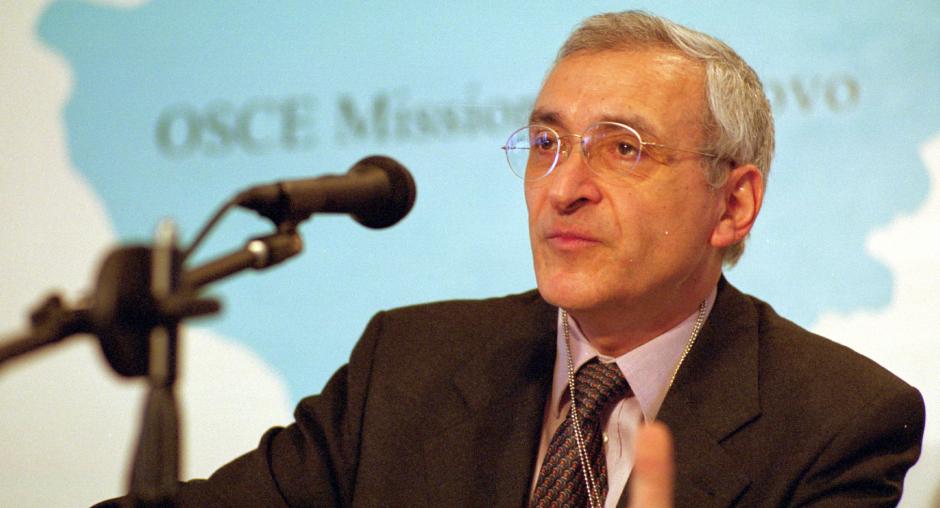Newsroom
Head of OSCE Kosovo Mission: History is our enemy
PRISTINA 29 May 2003

(Lubomir Kotek/OSCE)Head of the OSCE Mission in Kosovo, Pascal Fieschi of France, speaking at a press conference. (Lubomir Kotek/OSCE) Photo details
PRISTINA, 29 May 2003 - Almost four years after the OSCE began its work in Kosovo, the environment remains one of rapid change but Kosovo has been firmly established on the international agenda of unfinished business, Ambassador Pascal Fieschi, Head of the OSCE Mission, said on Thursday.
"Institutions have been created but democratic standards, human rights, and the rule of law have yet to be institutionalized," he told the 55-nation OSCE Permanent Council in Vienna.
"In the future we will be working in an environment where far more decisions are taken by local elected and appointed officials. Our message that we need to get across is that, with the increased handover of authority comes an increased obligation upon the Kosovo institutions themselves to perform their duties well."
Ambassador Fieschi said that every year the basic goals for Kosovo remained the same - a democratic society where people of different backgrounds can live together in mutual acceptance, responsible self-government, and ultimately integration into the region and Europe: "Continued commitment has never been more essential."
He reminded the OSCE's main regular policy and negotiating body that the transfer of powers to local bodies from the international community institutions in Kosovo was difficult, but also provided a perspective for the OSCE's work.
"The task now facing us is to develop a partnership with multiple elements of Kosovo society - with politicians in the government, with civil society, with ordinary people," said Ambassador Fieschi.
"The difference we make is that without us various tendencies in Kosovo's society will go unchecked: the tendency towards boycott rather than constructive opposition, the tendency towards intolerance, and the tendency towards accepting the old way of doing things."
But he believed that through dialogue, interaction between people, and training and demonstration of good practice such negative tendencies were being overcome. "We work to explain why the standards are there, why they are necessary, and how they can be met."
The OSCE, the institution-building pillar within the United Nations Mission in Kosovo, has already taken a number of steps to ensure that OSCE-created institutions, when handed over, are sustainable and will continue to work for Kosovo.
"We are reminded every day in Kosovo that history is our enemy," he concluded. "Poverty and economic backwardness are its powerful allies, and perhaps even more dangerous in the long run. We as the OSCE cannot solve this problem. What we can do is contribute to making a society more fit to tackle it for itself."
"Institutions have been created but democratic standards, human rights, and the rule of law have yet to be institutionalized," he told the 55-nation OSCE Permanent Council in Vienna.
"In the future we will be working in an environment where far more decisions are taken by local elected and appointed officials. Our message that we need to get across is that, with the increased handover of authority comes an increased obligation upon the Kosovo institutions themselves to perform their duties well."
Ambassador Fieschi said that every year the basic goals for Kosovo remained the same - a democratic society where people of different backgrounds can live together in mutual acceptance, responsible self-government, and ultimately integration into the region and Europe: "Continued commitment has never been more essential."
He reminded the OSCE's main regular policy and negotiating body that the transfer of powers to local bodies from the international community institutions in Kosovo was difficult, but also provided a perspective for the OSCE's work.
"The task now facing us is to develop a partnership with multiple elements of Kosovo society - with politicians in the government, with civil society, with ordinary people," said Ambassador Fieschi.
"The difference we make is that without us various tendencies in Kosovo's society will go unchecked: the tendency towards boycott rather than constructive opposition, the tendency towards intolerance, and the tendency towards accepting the old way of doing things."
But he believed that through dialogue, interaction between people, and training and demonstration of good practice such negative tendencies were being overcome. "We work to explain why the standards are there, why they are necessary, and how they can be met."
The OSCE, the institution-building pillar within the United Nations Mission in Kosovo, has already taken a number of steps to ensure that OSCE-created institutions, when handed over, are sustainable and will continue to work for Kosovo.
"We are reminded every day in Kosovo that history is our enemy," he concluded. "Poverty and economic backwardness are its powerful allies, and perhaps even more dangerous in the long run. We as the OSCE cannot solve this problem. What we can do is contribute to making a society more fit to tackle it for itself."
